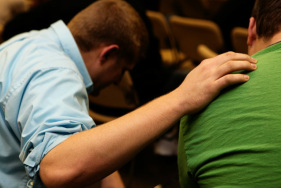 By Erin McAllister Gemeinschaft Home stands as the only offender reentry program in Virginia that utilizes the principles of restorative justice in every facet of its mission. Through a therapeutic approach that focuses on personal accountability, we seek to instill a sense of confidence and responsibility in ex-offenders and to equip them with vital tools to support their own wellbeing as well as to contribute to their families and community. Restorative justice is a fairly new concept that has developed over the past few decades, largely because of scholars such as Howard Zehr of Eastern Mennonite University, in Harrisonburg, Virginia. In the 1970s, Dr. Zehr operated a small halfway house, a time in which he observed many unresolved issues within the criminal justice system. He also identified certain aspects of crime that the highly punitive American justice system simply did not address. Such issues left victims without closure and offenders without accountability to their victims, diminishing the community as a whole. These circumstances have only worsened in recent decades, with a steady increase in rates of incarceration (and mandatory sentencing guidelines) particularly for non-violent crimes. Zehr believes that restorative justice offers a more productive tactic that benefits everyone involved in criminal behavior—offenders, victims, and the community. During a recent interview, Dr. Zehr explained that restorative justice is an approach to crime that is comprised of three principles: 1. Repairing the harm that is caused by wrongdoing (restoration); 2. Encouraging appropriate accountability for addressing needs and repairing harm; 3. Engaging those impacted by the wrongdoing, including the victim, the offender, the community. Zehr also emphasized that restorative justice is a highly adaptable practice, successful with individuals of any age, gender, race, etc., and helps to dispel the widespread myth that adult offenders are incapable of reformation. He also pointed out that research on restorative justice is very positive, as lower rates of recidivism (offenders who commit crimes and return to incarceration) have been reported widely in connection with restorative justice practices. Supporters of restorative justice still face the opposition of skeptics who push for harsher punitive measures and longer prison sentences for people who commit (non-violent) crimes. But the programs at Gemeinschaft Home provide an alternative path, one that leads to positive outcomes and supports individuals who seek to become healthy, productive members of the community. Comments are closed.
|
Archives
August 2023
|